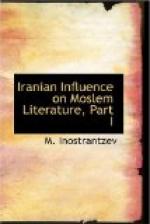The religious bodies which enjoy rights of subjects under the protection of law are four,—the Jews, the Christians, the Majus, and the Sabiah. (P. 67-69).
[Sidenote: Nauruz and Miherjan.]
The worshippers of idols in Sind are not of the Dhimma, nor those under the protection of Islam; it is on this account that they are exempted from the poll tax. The Majus are counted with the Dhimma; for Omar ordered them to be treated in the same way as the people of the book (the Jews and Christians;) the fact that we call the followers of one and the same code of doctrines by two names, one of praise and one of blame, does not arise from eulogising or reviling on our part; our object is merely to shew what others think of any sect, and by what names they call them. (P. 7).
THAALIBI.
EDITED AND TRANSLATED BY H. ZOTENBERG.
And Behram was matchless among kings, perfect in manners and facile of tongue. For he used to converse on the days of public assemblies and courtly meetings in Arabic and in matters of receiving petitions and granting of the gifts in Persian, and when giving public audiences he used the Dari language, and when playing polo he used Pahlavi, and Turkish while at war, and when out hunting the language of Zabulistan and in legal matters Hebrew, in questions of medicine the Indian language, in Astronomy the language of the Greeks, and while on voyage he used the Nabatian language and while speaking with women he used the speech of Herat. (P. 555).
That Thaalibi knew the correct distinction between Pahlavi and Persian can be seen from the fact that he says at p. 633 of his history with reference to the book of Kalileh wa Dimna as follows:—When Burzuyeh arrived at the court and presented himself before Anushirwan he recounted to him what had happened to him and announced to him as a happy event that he was in possession of the book. Then he made a present of it to the king. (Anushirwan was charmed with it and he gave the order to translate the book into Pahlavi.) Burzuyeh requested and got from the king the permission to place at the head of the first chapter the king’s name, and a notice of his life. And the book remained carefully guarded with the kings of Persia until Ibn Muquaffa translated it into Arabic and Rudaki at the command of Amir Nasr Ibn Ahmad turned it into Persian verse.
Reference to Kitab al Ain. (P. 14.)
Reference to the murder and burial of the last Sasanian king, (P. 748.)



